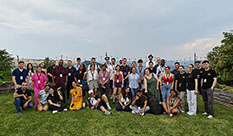More:
News & Stories
New Research Examines Student Learning Experiences in Zoom
Dorin Levy, an undergraduate student in the Faculty of Instructional Technologies, and Dr. Hagit Meishar-Tal, a senior lecturer in the faculty, have published a new scientific paper in the Interactive Learning Environments journal. The paper addresses one of the most relevant topics in the era of digital learning: students' experiences participating in group tasks in virtual breakout rooms on the ZOOM platform.

Dr. Hagit Meishar-Tal
The research was based on interviews with undergraduate female students, using the Community of Inquiry theory, which combines three critical components for online learning: cognitive presence, teaching presence, and social presence. The findings show that many students experience virtual rooms as a limited learning spaces that do not always contribute to understanding and collaboration. The main reasons for this are feelings of isolation, lack of clear guidance, and difficulty creating meaningful interactions with group members.
However, in cases where all three types of presence are fully realized—when guidance is clear, interaction among participants is supportive, and the sense of involvement in learning is high—students' learning experience is enhanced.
The paper not only offers deep insights into perceptions of online learning but also serves as an impressive example of academic collaboration between a lecturer and an undergraduate student, a collaboration that strengthens the faculty's values of research-based learning, advanced pedagogy, and close relationships between faculty and students.
Grant Award from MOFET Institute
Alongside publishing the paper, Dr. Meishar-Tal continues to lead groundbreaking research in education in the era of Artificial Intelligence. Recently, she won a prestigious grant from the MOFET Institute in collaboration with Prof. Tami Seifert and Prof. Miri Sheinfeld from Kibbutzim College of Education.
The joint research, currently in its initial stages, examines changes in teaching practices following the introduction of Generative Artificial Intelligence technologies, particularly tools based on large language models (like Chat GPT).
The research focuses on deep pedagogical questions, such as how do lecturers respond to students' use of these tools? What adaptations are made in lesson planning, learning assessment, and teaching relationships? Through a combination of quantitative surveys and qualitative in-depth interviews, the researchers aim to map lecturers' attitudes, identify challenges, and outline directions for professional development that will enable teacher educators to train the next generation of teachers while adapting to a changing technological reality.
Initial findings already reveal gaps between approaches: some lecturers show high openness and claim that AI can improve teaching, while others worry about its impact on learning processes. However, most support a responsible integration approach rather than an outright ban.
"Dr. Meishar-Tal's research not only advances theoretical knowledge in the field of Instructional technologies but also offers practical tools for the education system and academia to deal with the challenges of the artificial intelligence era," says Prof. Gila Kurtz, Dean of the Faculty of Instructional Technologies "I am particularly proud of the integration of students in academic research as early as the undergraduate level, demonstrating the faculty's commitment to nurturing the future generation of graduates who will lead the field."
Dr. Meishar-Tal's research achievements, both in collaboration with students and as part of multi-institutional teams, demonstrate HIT's commitment to promoting academic excellence, pedagogical innovation, and practical engagement with teaching challenges in the digital age.
Posted: 19/05/2025
- News & Events
International Week of Interdisciplinary Studies and Academic Collaborations in Crete
A substantial delegation of 16 students and four faculty members from HIT Holon Institute of Technology participated in week-long international activities and events at HMU-Hellenic Mediterranean University in Crete. ...


 Additional programs
Additional programs
